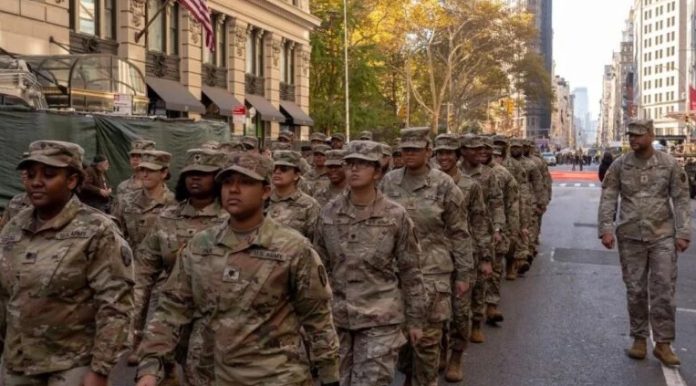Last week, the US Army “issued a recruitment notice,” New York Post reports.
According to critics, this is a sure sign that the military is preparing for war. The advert states:
There are no signs of diversity, equity, and inclusion in the 30-second spot, which features white males jumping out of a plane.
For decades, the Army has emphasised the diversity of the military and told soldiers:
If you’re a white male, you are part of the problem.
Now the Army is looking for old-fashioned soldiers from traditional sources. Because, for good or bad, if you want combat soldiers, you’re going to have to recruit mostly white males – and, even worse from the military’s perspective, white males from the South and Midwest.
Historically, mostly white males have been appointed to combat positions, despite the fact that the Army as a whole has become more diverse. This remains a problem enough that the Army has been concerned about it for some time, but mostly in terms of its impact on the promotion of minority and female officers, since senior leadership is largely drawn from combat or “tactical” commands, New York Post reports.
Washington is involved, though so far without significant troops, in three military conflicts: Ukraine, China/Taiwan/Philippines, and the Middle East.
With each passing day, the likelihood that at least one of these will turn into a hot war for America increases. So the reason for urgency is even more compelling. The question is, will the adverts be effective?
White men from the South and Midwest were more likely to enlist because of traditions of patriotism and masculinity that are not particularly welcome in today’s military. (“You’re part of the problem” is a pretty bad sales pitch). Even worse is the command’s poor treatment of those soldiers who do enlist, according to New York Post.
The disgraceful and dishonourable flight from Afghanistan was a source of anger for many servicemen. It also demonstrated to potential recruits that the army – and the country’s civilian leadership – will praise patriotism and sacrifice when it suits them, but flush the results of those sacrifices down the toilet for petty political reasons.
As British Admiral Andrew Cunningham said during the Second World War:
It takes the Navy three years to build a ship. It will take 300 years to build a new tradition.
That’s not much of a stretch for today’s American brass. In the modern American military, loyalty goes both ways. But lately, winning is no longer a priority. And, of course, the welfare of servicemembers is not a priority either. One in eight military families rely on food banks and community pantries to make ends meet, hardly making military service more attractive. While the children of soldiers go without food, however, commanders have found millions of dollars to support gender change for soldiers because it goes without saying.
Thus, we see disrespect for a key demographic, disloyalty to military victims, and disregard for their daily well-being. None of this is conducive to successful recruiting. Perhaps the force can be replenished elsewhere.
There is a tradition of black bravery in combat: Just think of the Tuskegee Airmen and the Red Balloon Express. And we’ve seen brave women in combat. But the Army’s new publicity suggests it is returning to its recruiting roots under pressure. And in fact, the real problem is not so much the demographics of the recruits, but the people who recruit them, according to New York Post.
In recent years, the US Army has been more interested in social issues than in its real mission of deterring, defeating and destroying America’s enemies.
It is not the fault of the military – it’s the fault of the leaders. But who would want to sign up to lead people who don’t want to do their jobs? Politicised militaries do not win wars and they do not attract combat soldiers. There is no way that TV adverts can change that, we need change at the top.
